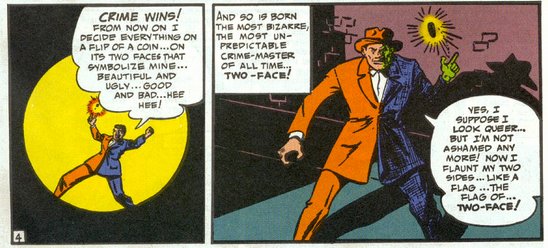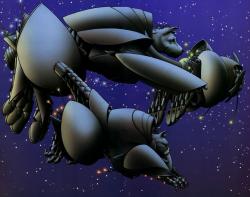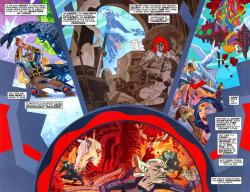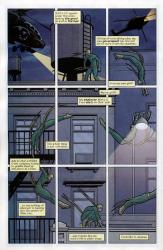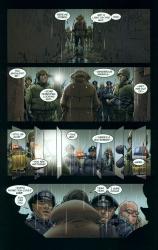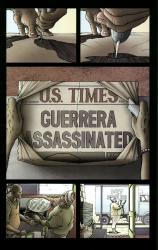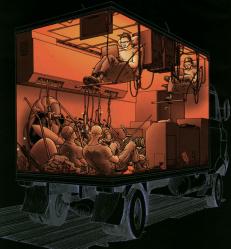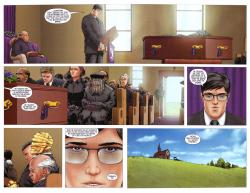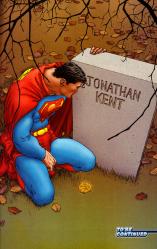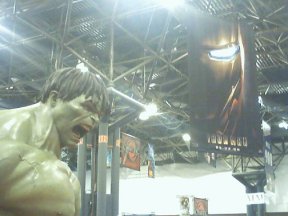This bit of audio here is important. It’s from DC’s Final Crisis Management panel from San Diego Comic-con 2008. Thanks to Jamie Coville for the mp3 of the panel.
[MEDIA not found]
The bit I want to talk about:
The whole idea with Mister Miracle, Mister Miracle was supposed to be a book where everyone was black and that was the idea. I wanted to do like, Metron as Sun-Ra. He’d sit in this big Sun-Ra chair with mirrors and stuff.
But, it wasn’t drawn that way. And when they drew the second issue, they drew the homeless New Gods as white guys, don’t ask me why. ’cause everyone in that book was supposed to be black characters ’cause I wanted the whole thing to be based on Shilo Norman and his world. But, those guys shouldn’t be white, sometimes things just happen, artists tend to draw white guys.
Before I go in, I should probably explain some things about myself.
It’s fair to say that I’m under-educated. My college career was derailed around two months before it really got going, and I’ve been off-track ever since. I went from almost being a Buckeye to being whatever this is. It sucked, if you were wondering.
I eventually got serious about school, starting caring again, and flexing my underachieving muscles. Kanye West dropped his College Dropout album and I hated on it originally. “Telling kids to drop out of college?” I thought. “Way to go, Kanye. I thought you were supposed to be smart.” I mean, here’s a bit from his song “School Spirit:”
Told ’em I finished school, and I started my own business
They say, ‘Oh you graduated?’
No, I decided I was finished
So, yeah, a few years later and I’m pretty much officially a college drop out with a job that pays better than anything I’d have gotten fresh out of college.
The point of this is that I’m not exactly trained. Almost everything I know, I learned because I wanted to or because I experienced it. I can’t cite sources or trace lineages for ideas, but I know a little bit about a little bit. I’m smart enough to be able to form arguments and talk about them intelligently. I’m not Encyclopedia Brown, is my point. Pardon my poor phrasings or ignorance.
What’s this got to do with black New Gods?
Grant Morrison came very close to writing one of the best stories about the black experience. I can’t speak to whether it was on purpose or not. My gut says “Yes, to an extent,” so I’ll go with that.
Looking back, in most things I’ve read, most advice I’ve been given, and most stories I’ve heard, the one theme that’s almost universal among black people is “elevation.” You are more than what you appear to be, you will be more than you are, what you are now is only the beginning, and so on.
If you put some thought on it, it makes sense. Slavery stripped blacks of almost every possible form of identity. National, familial, religious, and tribal identity were completely wiped due to the slave trade. At that point, what history do you have left? Not much of one, right? What do you do when you don’t have a past?
You embrace the future.
I can’t speak to the specifics of Afro Futurism, but it’s a common trait amongst a lot of black thought. Boiled down, it’s all about being more than what you are, because what you aren’t isn’t that much at all. We aren’t slaves– we’re kings and queens. We came here on slave ships, but we’re gonna leave on space ships.
What’s getting high? Getting lifted.
You can see it in the music. Andre 3000, Sun Ra, George Clinton, and even Lil Wayne are examples of Afro Futurism. Saul Williams in particular has wholly embraced the idea of it. Here’s an excerpt from “Ohm” off the Lyricist Lounge record.
the beat don’t stop when, Earth sends out satellites
to spy on Saturnites and control Mars
cause niggas got a peace treaty with Martians
and we be keepin em up to date with sacred gibberish
like “sho’ nuff” and “it’s on”
It isn’t just about being “weird” and “out there,” though. You can see it in a man’s swagger. Swagger isn’t just about how you walk. It’s your style. It’s your demeanor. It’s how you walk, how you talk, how you dress, and how you carry yourself. A lot of hip-hop heads are gadget hounds. They’ve gotta have the newest and baddest thing out there. There’s a lot of jokes about bling bling or whatever, and part of it is certainly crass commercialism, but it’s also another way to show your individuality and embrace something bigger than you are. It’s a way to become you.
It’s like Key23 in The Invisibles, or “Let there be light.” it’s turning fiction into fact.
Look at the Wu-Tang Clan. The RZA is part rapper, part kung fu warrior, part chess master, part superhero, and then part Bobby Digital. Bobby’s something greater than the RZA who is in turn greater than Robert Diggs.
The cipher is an important part of rap. Or it was. I can’t tell any more. Another word for it is “circle.” The cipher contains men who are not much by themselves, but are something important when together. You’ve heard the advice “Watch who you let into your circle?” Your circle is your cipher. It’s your family and it is important.
Parents want their kids to be better than they were. What matters is that the next generation ends up better off than the previous one. Go to school, get a job, leave the ghetto, do something, be something. You don’t have a history and your people don’t have a history worth speaking of. So, you have to create one.
Elevate yourself. What you are is not everything that you are.
I’m not an expert on Afro Futurism. I can’t tell you exactly where it came from, but I’ve got a pretty good idea why it exists. It is about elevation. It’s taking what you are and becoming something else. It’s being a butterfly.
Chris Randle picked up on the Morrison thing a while back. He linked to this fascinating piece about black sci-fi. I don’t know that I’ve read any, to be honest, but the themes and ideas in it are familiar. Creating/ascending to/acquiring/forcing a heaven that you do not currently have into existence.
All of this goes back to having the direct link to your past stolen by slavery. It’s all well and good to know that you came from Africa at some point– but where? When? Who were you related to? How do you get past that?
Why is this important and how does it relate to the New Gods?
The New(er) Gods were originally all supposed to be black at first. They were the new incarnations of the New Gods, who were themselves the successors to the Old Gods of the Third World. The New Gods becoming black would have continued the tradition of elevation.
In 7 Soldiers: Mister Miracle, Shilo Norman pulls off a trick that involves escaping from a black hole. Inside the hole, he met Metron of the New Gods, who informed him that evil was on its way and that Shilo must be prepared for the coming horror. He meets the reincarnated, or maybe just incarnated, versions of the good New Gods while going through his training, and they are broken and decrepit. The evil gods have won. Shilo passes through the crucible and beats death, finally proving that he’s ready to lead the charge. In Final Crisis, he’s seen gathering heroes to fight Darkseid and the forces of evil.
Shilo being the champion of the New Gods is an intensely powerful image on a variety of levels. By being the first of the New Gods, he’s attained what Afro Futurism and elevation represents. He’s elevated to a higher state. He’s achieved his potential. His figurative lack of a past no longer matters. He’s beyond that now.
On a level that’s both higher and lower than that at the same time, Mister Miracle represents something else entirely. He’s the world’s greatest escape artist. He can easily escape from traps, games, gimmicks… and chains. He’s thrown off his personal chains of oppression. He’s a freed slave, and in becoming so, is also the master of his destiny. He becomes the Harriet Tubman (or maybe Catcher Freeman) for the superheroes/New Gods. He has to rescue them and lead them to safety.
He’s found his true identity and elevated.
Grant Morrison has said that all we’ve seen of the New Gods before Final Crisis is just a sliver of their true existence. In FC, we see the full extent of their being. Isn’t this similar to the idea that a person represents something greater than himself? You are not what you appear to be, you are something more?
If not for that unfortunate art error, Morrison might have written a story that’d resonate even deeper with some of his fans. It’s already rife with layered meaning, but the meaning that almost was is amazing.
It’s worth thinking about. It’s probably a story worth telling, too.


